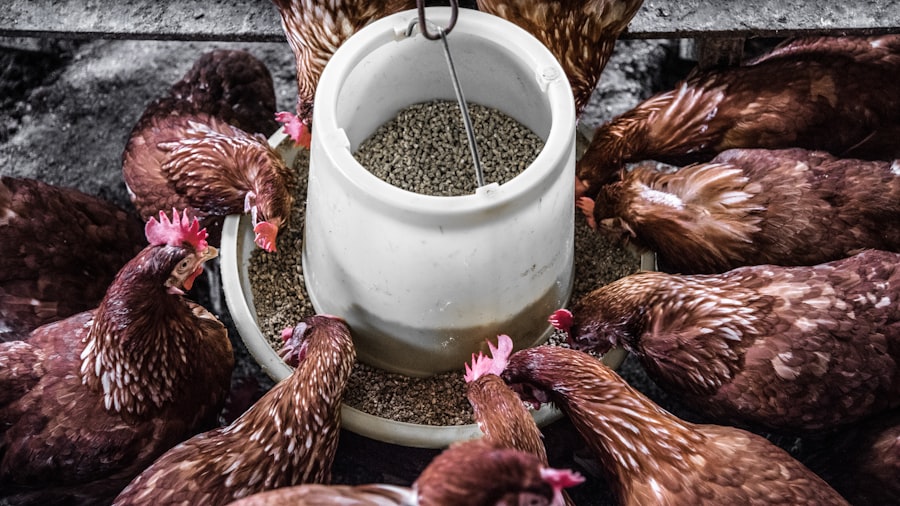During the winter months, chickens’ egg-laying habits can be affected by the decrease in daylight hours. It is important to provide a comfortable and stress-free environment for chickens to ensure they continue laying eggs. In this article, we will discuss the winter egg-laying habits of chickens and provide tips on how to keep them healthy and happy during the colder months.
Key Takeaways
- Chickens can lay eggs in the winter, but their egg-laying habits are affected by the amount of daylight they receive.
- A warm and cozy chicken coop is essential for keeping chickens healthy and productive during the winter months.
- Proper lighting in the coop can help regulate egg-laying and keep chickens healthy.
- Feeding chickens a nutritious diet and keeping them hydrated is important for their overall health and egg production.
- Keeping the coop clean and dry and protecting chickens from predators are crucial for maintaining a healthy flock and enjoying fresh eggs all winter long.
Understanding the Winter Egg-Laying Habits of Chickens
As the days get shorter and the nights get longer during winter, chickens’ egg-laying habits naturally change. Chickens require a certain amount of daylight to stimulate their reproductive system and lay eggs. When there is a decrease in daylight hours, their egg production can slow down or even stop altogether.
To ensure that chickens continue laying eggs during the winter months, it is important to provide them with a comfortable and stress-free environment. Stress can negatively impact their health and egg-laying habits. By creating a cozy and warm chicken coop, you can help alleviate any stress they may experience due to the colder temperatures.
Providing a Warm and Cozy Chicken Coop
One of the most important aspects of keeping chickens healthy during winter is providing them with a warm and cozy chicken coop. Insulation is key to keeping the coop warm. You can use materials such as straw or hay to insulate the walls and floor of the coop. This will help retain heat and keep the chickens warm.
Draft-proofing is also essential to prevent cold air from entering the coop. Check for any gaps or cracks in the walls or windows and seal them with caulk or weatherstripping. This will help maintain a consistent temperature inside the coop.
Proper ventilation is crucial in preventing moisture buildup and respiratory issues. While it may seem counterintuitive to have ventilation in a warm coop, it is necessary to remove excess moisture from the air. Moisture can lead to mold growth and respiratory problems for the chickens. Install vents near the top of the coop to allow for proper airflow without creating drafts.
Maintaining Proper Lighting in the Coop
Adding artificial lighting to the coop can help stimulate egg production during the winter months. By providing additional light, you can mimic longer daylight hours and encourage chickens to continue laying eggs.
When setting up lighting in the coop, it is important to avoid stressing out the chickens. Gradually increase the amount of light each day until you reach a total of 14-16 hours of light. Use a timer to ensure consistent lighting and to mimic natural daylight patterns.
It is also important to provide a period of darkness for the chickens to rest. Allow for at least 8 hours of darkness each day to give them time to sleep and recharge.
Feeding Your Chickens a Nutritious Diet
A balanced and nutritious diet is essential for keeping chickens healthy and happy during the winter months. During this time, it is important to provide them with high-protein feed to support their egg production. Look for feeds that are specifically formulated for laying hens.
In addition to their regular feed, you can supplement their diet with fresh fruits and vegetables. This will provide them with additional nutrients and help keep them entertained during the winter months when they may have limited access to outdoor foraging.
Keeping Your Chickens Hydrated

Chickens can become dehydrated during the winter months due to the dry air and lack of fresh water sources. It is important to provide fresh water daily and ensure that it does not freeze. You can use heated waterers or check on the water throughout the day to make sure it remains unfrozen.
Adding electrolytes to their water can also help keep chickens hydrated and healthy. Electrolytes provide essential minerals and nutrients that support their overall well-being.
Preventing Stress in Your Chickens
Stress can have a negative impact on chickens’ health and egg-laying habits. To prevent stress, it is important to provide enough space for the chickens to move around comfortably. Overcrowding can lead to aggression and stress among the flock.
Avoid sudden changes in their environment, such as introducing new chickens or rearranging their living space. Chickens thrive on routine and familiarity, so maintaining a consistent environment will help keep them calm and stress-free.
Keeping Your Coop Clean and Dry
A clean and dry coop is essential for preventing health issues in chickens. During the winter months, moisture can build up in the coop due to condensation from their breath and droppings. This can lead to mold growth and respiratory problems.
Regularly clean the coop by removing any wet bedding or droppings. Replace it with fresh bedding to keep the coop dry and odor-free. Additionally, make sure to regularly check for any signs of mold or mildew and address them promptly.
Protecting Your Chickens from Predators
Predators can be more of a threat to chickens during the winter months when food sources are scarce. It is important to take extra precautions to protect your flock during this time.
Secure fencing is essential to keep predators out of the chicken coop. Make sure that there are no gaps or holes in the fencing that predators can squeeze through. Additionally, lock the coop at night to prevent predators from entering while the chickens are sleeping.
Enjoying Fresh Eggs All Winter Long
By providing a comfortable and stress-free environment for your chickens during the winter months, you can ensure that they stay healthy and continue laying eggs all winter long. Remember to keep their coop warm and cozy, maintain proper lighting, feed them a nutritious diet, keep them hydrated, prevent stress, keep the coop clean and dry, and protect them from predators.
Following these tips will not only benefit your chickens but also allow you to enjoy fresh eggs throughout the winter season. So, take the necessary steps to keep your chickens happy and healthy, and enjoy the rewards of their winter egg-laying habits.
If you’re looking for ways to keep your chickens laying eggs throughout the winter, you’ll definitely want to check out this informative article on poultrywizard.com. They provide some great tips and tricks on how to create the perfect chicken coop interior to ensure your feathered friends stay happy and productive even in the colder months. From insulation and ventilation to lighting and nesting boxes, this article covers it all. Don’t miss out on this valuable resource! Click here to read more.
FAQs
What is the reason why chickens stop laying eggs in the winter?
Chickens stop laying eggs in the winter due to the decrease in daylight hours and the drop in temperature.
How can I keep my chickens warm during the winter?
You can keep your chickens warm during the winter by insulating their coop, providing them with a heat source, and ensuring that their water doesn’t freeze.
What should I feed my chickens during the winter?
You should feed your chickens a balanced diet that includes protein, carbohydrates, and fats. You can also supplement their diet with scratch grains and mealworms.
How can I increase the amount of light my chickens receive during the winter?
You can increase the amount of light your chickens receive during the winter by installing artificial lighting in their coop. This will help to simulate longer daylight hours and encourage them to lay eggs.
What are some common health issues that chickens face during the winter?
Chickens are more susceptible to respiratory infections and frostbite during the winter. It’s important to keep their coop clean and dry and to provide them with adequate ventilation.
How often should I collect eggs during the winter?
You should collect eggs from your chickens at least once a day during the winter to prevent them from freezing and cracking.
Meet Walter, the feathered-friend fanatic of Florida! Nestled in the sunshine state, Walter struts through life with his feathered companions, clucking his way to happiness. With a coop that’s fancier than a five-star hotel, he’s the Don Juan of the chicken world. When he’s not teaching his hens to do the cha-cha, you’ll find him in a heated debate with his prized rooster, Sir Clucks-a-Lot. Walter’s poultry passion is no yolk; he’s the sunny-side-up guy you never knew you needed in your flock of friends!







